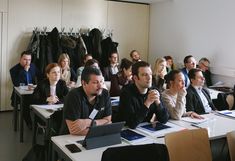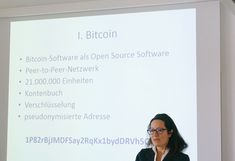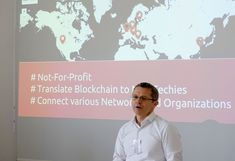Combating tax fraud, the pay out of an insured amount and self-executing contracts – what do they have in common? All these procedures can be facilitated by blockchain. Blockchain is increasingly becoming the basis of many daily transactions, promising high safety and transparency.
Blockchain, cryptocurrencies and smart contracts – what are these terms all about and what can we expect from these new technologies? These were the questions to be discussed on 30 November, 2016 at the University of Natural Resources and Life Sciences, Vienna. Univ.-Prof. Dr. Iris Eisenberger, M.Sc. (LSE), Institute of Law, and Univ.-Prof. Dr. Tina Ehrke-Rabel, Department of Tax and Fiscal Law (University of Graz) hosted the workshop on “Blockchain, Cryptocurrency, Smart Contracts” in cooperation with Dr. Stephan Pachinger, LL.M., Partner at Freshfields Bruckhaus Deringer.
The workshop consisted of five talks and subsequent vivid discussions. The first talk was given by Dr. Elisabeth Hödl, a legal expert, future researcher and author. She gave a lucid overview of the philosophical and technological basis of blockchain with an emphasis on questions regarding privacy and anonymity, as well as independence from state authorities.
But what is a blockchain? A blockchain is a type of distributed ledger comprised of unchangeable, digitally recorded data in packages called blocks. These blocks of data are stored in a linear chain. Transparency, reliability and decentralized networks: those are the main benefits of blockchain. One of the most well-known applications of blockchain is the cryptocurrency bitcoin. Thomas Zeinzinger, cofounder of Inkubators & Coworking Space lab10, elaborated on new business models which are arising in the field of cryptocurrencies based on blockchain.
Blockchain also opens up new possibilities from a legal perspective. Smart contracts – protocols that facilitate or enforce contract performances using blockchain – are not only transparent but contribute to faster transactions and lower transaction costs. Mag. Eva Schneider, M.Sc., associate at Freshfields Bruckhaus Deringer, illustrated the promising options and the legal challenges with examples ranging from travel insurance and the Internet of Things to elections.
Furthermore, from a legal perspective, the question arises of how this new technology can or should be regulated. In his talk on regulatory aspects of FinTech, Dr. Friedrich Jergitsch, partner at Freshfields Bruckhaus Deringer, pointed out that there already exists a European framework for financial services which use technologies such as blockchain.
The last talk was held by Tina Ehrke-Rabel and Iris Eisenberger. Dealing with the tension between the state and blockchain technology, they drew attention to urgent issues in terms of whether regulations are required to avoid governmental erosion and how blockchain can be an efficient tool for governmental agendas. As an example of the latter, they discussed the use of blockchain for border-crossing enforcement of sales tax.
The workshop made clear that the field of application for blockchain is wide. Taking both the legal and the technological perspective into account promotes a more comprehensive and broad understanding of this complex technology. Blockchain definitely bears potential, but the legal regulation of blockchain is challenging. Therefore, further discussion on possible solutions is required in order to realise its full potential.
Franziska Bereuter, 30.11.2016










